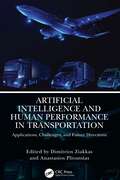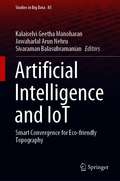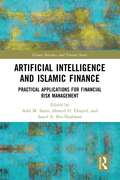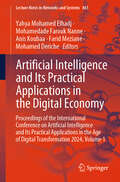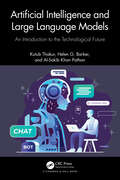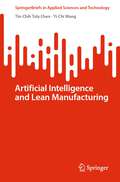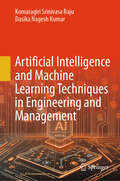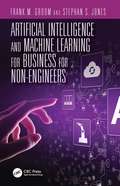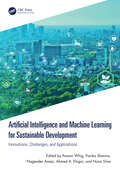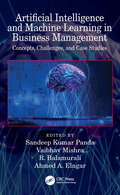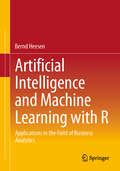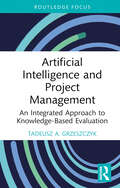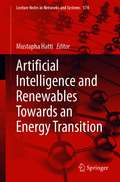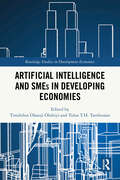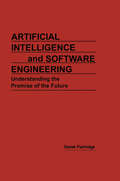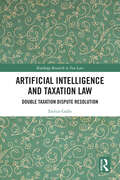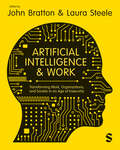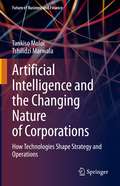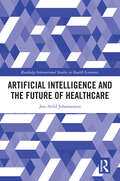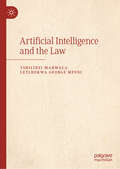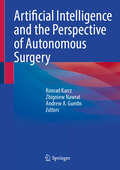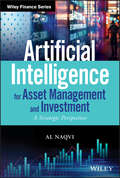- Table View
- List View
Artificial Intelligence and Human Performance in Transportation: Applications, Challenges, and Future Directions
by Dimitrios Ziakkas Anastasios PlioutsiasArtificial Intelligence (AI) is a major technological advancement in the 21st century. With its influence spreading to all aspects of our lives and the engineering sector, establishing well-defined objectives is crucial for successfully integrating AI in the field of transportation. This book presents different ways of adopting emerging technologies in transportation operations, including security, safety, online training, and autonomous vehicle operations on land, sea, and air.This guide is a dynamic resource for senior management and decision-makers, with essential practical advice distilled from the expertise of specialists in the field. It addresses the most critical issues facing transportation service providers in adopting AI and investigates the relationship between the human operator and the technology to navigate what is and is not feasible or impossible. Case studies of actual implementation provide context to common scenarios in the transportation sector.This book will serve the reader as the starting point for practical questions regarding the deployment and safety assurance of new and emergent technologies in the transportation domains. Artificial Intelligence and Human Performance in Transportation is a beneficial read for professionals in the fields of Human Factors, Engineering (Aviation, Maritime and Land), Logistics, Manufacturing, Accident Investigation and Safety, Cybersecurity and Human Resources.
Artificial Intelligence and IoT: Smart Convergence for Eco-friendly Topography (Studies in Big Data #85)
by Kalaiselvi Geetha Manoharan Jawaharlal Arun Nehru Sivaraman BalasubramanianThis book projects a futuristic scenario that is more existent than they have been at any time earlier. To be conscious of the bursting prospective of IoT, it has to be amalgamated with AI technologies. Predictive and advanced analysis can be made based on the data collected, discovered and analyzed. To achieve all these compatibility, complexity, legal and ethical issues arise due to automation of connected components and gadgets of widespread companies across the globe. While these are a few examples of issues, the authors’ intention in editing this book is to offer concepts of integrating AI with IoT in a precise and clear manner to the research community. In editing this book, the authors’ attempt is to provide novel advances and applications to address the challenge of continually discovering patterns for IoT by covering various aspects of implementing AI techniques to make IoT solutions smarter. The only way to remain pace with this data generated by the IoT and acquire the concealed acquaintance it encloses is to employ AI as the eventual catalyst for IoT. IoT together with AI is more than an inclination or existence; it will develop into a paradigm. It helps those researchers who have an interest in this field to keep insight into different concepts and their importance for applications in real life. This has been done to make the edited book more flexible and to stimulate further interest in topics. All these motivated the authors toward integrating AI in achieving smarter IoT. The authors believe that their effort can make this collection interesting and highly attract the student pursuing pre-research, research and even master in multidisciplinary domain.
Artificial Intelligence and Islamic Finance: Practical Applications for Financial Risk Management (Islamic Business and Finance Series)
by Adel M. SareaThis book provides a systematic overview of the current trends in research relating to the use of artificial intelligence in Islamic financial institutions (IFIs), across all organization of Islamic cooperation (OIC) countries. Artificial Intelligence and Islamic Finance discusses current and potential applications of artificial intelligence (AI) for risk management in Islamic finance. It covers various techniques of risk management, encompassing asset and liability management risk, credit, market, operational, liquidity risk, as well as regulatory and Shariah risk compliance within the financial industry. The authors highlight AI’s ability to combat financial crime such as monitoring trader recklessness, anti-fraud and anti-money laundering, and assert that the capacity of machine learning (ML) to examine large amounts of data allows for greater granular and profound analyses across a variety of Islamic financial products and services. The book concludes with practical limitations around data management policies, transparency, and lack of necessary skill sets within financial institutions. By adopting new methodological approaches steeped in an Islamic economic framework (e.g., analysing FinTech in the context of Shariah principles and Islamic values), it devises practical solutions and generates insightful knowledge, helping readers to understand and explore the role of technological enablers in the Islamic finance industry, such as RegTech and artificial intelligence, in providing better and Shariah-compliant services to customers through digital platforms. The book will attract a wide readership spanning Shariah scholars, academicians, and researchers as well as Islamic financial practitioners and policymakers.
Artificial Intelligence and Its Practical Applications in the Digital Economy: Proceedings of the International Conference on Artificial Intelligence and Its Practical Applications in the Age of Digital Transformation 2024, Volume 1 (Lecture Notes in Networks and Systems #861)
by Anis Koubaa Farid Meziane Yahya Mohamed Elhadj Mohamedade Farouk Nanne Mohamed DericheArtificial Intelligence (AI) technologies hold immense promise for developing countries by offering innovative solutions to longstanding challenges. By leveraging AI in health care, education, economic development, infrastructure, and resource management, these countries can potentially leapfrog traditional development stages and improve the quality of life for their populations. However, it's essential to approach AI deployment with ethical considerations to ensure that the technology serves the best interests of these communities and thus to maximize the expected benefits. The I2COMSAPP'24 "International Conference on Artificial Intelligence and its Applications in the Age of Digital Transformation" aims to provide an excellent opportunity to gather experts, researchers, practitioners, and innovators from various fields to explore the latest advancements, challenges, and practical implementations of artificial intelligence and machine learning (ML) technologies. Moreover, it aims to foster knowledge sharing, collaboration, and networking among professionals who are driving responsible and innovative use of AI and leveraging real-world applications for the betterment of society and industries.
Artificial Intelligence and Its Practical Applications in the Digital Economy: Proceedings of the International Conference on Artificial Intelligence and its Practical Applications in the Age of Digital Transformation 2024, Volume 2 (Lecture Notes in Networks and Systems #862)
by Anis Koubaa Farid Meziane Yahya Mohamed Elhadj Mohamedade Farouk Nanne Mohamed DericheArtificial Intelligence (AI) technologies hold immense promise for developing countries by offering innovative solutions to longstanding challenges. By leveraging AI in health care, education, economic development, infrastructure, and resource management, these countries can potentially leapfrog traditional development stages and improve the quality of life for their populations. However, it's essential to approach AI deployment with ethical considerations to ensure that the technology serves the best interests of these communities and thus to maximize the expected benefits. The I2COMSAPP'24 "International Conference on Artificial Intelligence and its Applications in the Age of Digital Transformation" aims to provide an excellent opportunity to gather experts, researchers, practitioners, and innovators from various fields to explore the latest advancements, challenges, and practical implementations of artificial intelligence and machine learning (ML) technologies. Moreover, it aims to foster knowledge sharing, collaboration, and networking among professionals who are driving responsible and innovative use of AI and leveraging real-world applications for the betterment of society and industries.
Artificial Intelligence and Large Language Models: An Introduction to the Technological Future
by Al-Sakib Khan Pathan Kutub Thakur Helen G. BarkerHaving been catapulted into public discourse in the last few years, this book serves as an in-depth exploration of the ever-evolving domain of artificial intelligence (AI), large language models, and ChatGPT. It provides a meticulous and thorough analysis of AI, ChatGPT technology, and their prospective trajectories given the current trend, in addition to tracing the significant advancements that have materialized over time.Key Features: Discusses the fundamentals of AI for general readers Introduces readers to the ChatGPT chatbot and how it works Covers natural language processing (NLP), the foundational building block of ChatGPT Introduces readers to the deep learning transformer architecture Covers the fundamentals of ChatGPT training for practitioners Illustrated and organized in an accessible manner, this textbook contains particular appeal to students and course convenors at the undergraduate and graduate level, as well as a reference source for general readers.
Artificial Intelligence and Lean Manufacturing (SpringerBriefs in Applied Sciences and Technology)
by Tin-Chih Toly Chen Yi-Chi WangThis book applies artificial intelligence to lean production and shows how to practically combine the advantages of these two disciplines. Lean manufacturing originated in Japan and is a well-known tool for improving manufacturers' competitiveness. Prevalent tools for lean manufacturing include Kanban, Pacemaker, Value Stream Map, 5s, Just-in-Time and Pull Manufacturing. Lean Manufacturing and the Toyota Manufacturing System has been successfully applied to various factories and supply chains around the world. A lean manufacturing system can not only reduce wastes and inventory, but also respond to customer needs more immediately. Artificial intelligence is a subject that has attracted much attention recently. Many researchers and practical developers are working hard to apply artificial intelligence to our daily lives, including in factories. For example, fuzzy rules have been established to optimize machine settings. Bionic algorithms have been proposed to solve production sequencing and scheduling problems. Machine learning technologies are applied to detect possible product quality problems and diagnose the health of a machine. This book will be of interest to production engineers, managers, as well as students and researchers in manufacturing engineering.
Artificial Intelligence and Machine Learning Techniques in Engineering and Management
by Komaragiri Srinivasa Raju Dasika Nagesh KumarThe present book covers various facets of Artificial Intelligence, Machine Learning, and Fuzzy Logic. It includes a brief discussion on performance indicators, Classical and Advanced Machine Learning algorithms, Fuzzy logic-based modelling algorithms, Emerging Research Areas, including Blockchain, recent ML techniques, Evolutionary Algorithms, Large Language Model (LLM)-based Generative AI, the Internet of Things, Big Data, Decision Support Systems, Taguchi design of experiments, data augmentation, and Cross-Validation, and representative case studies. The appendix covers representative AI tools, data sources, books, and journals on AI. The present book can support undergraduate, postgraduate, and Ph.D. students in Artificial Intelligence, Generative Artificial Intelligence, Machine Learning, Data Sciences, Soft Computing, and Fuzzy Logic in Engineering and Management and allied fields. The proposed book has immense value in the interdisciplinary and cross-disciplinary context.
Artificial Intelligence and Machine Learning for Business for Non-Engineers (Technology for Non-Engineers)
by Frank M. Groom Stephan S. JonesThe next big area within the information and communication technology field is Artificial Intelligence (AI). The industry is moving to automate networks, cloud-based systems (e.g., Salesforce), databases (e.g., Oracle), AWS machine learning (e.g., Amazon Lex), and creating infrastructure that has the ability to adapt in real-time to changes and learn what to anticipate in the future. It is an area of technology that is coming faster and penetrating more areas of business than any other in our history. AI will be used from the C-suite to the distribution warehouse floor. Replete with case studies, this book provides a working knowledge of AI’s current and future capabilities and the impact it will have on every business. It covers everything from healthcare to warehousing, banking, finance and education. It is essential reading for anyone involved in industry.
Artificial Intelligence and Machine Learning for Sustainable Development: Innovations, Challenges, and Applications
by Ahmed A. Elngar Pawan Whig Nuno Silva Nagender Aneja Pavika SharmaArtificial Intelligence and Machine Learning for Sustainable Development is a comprehensive exploration of how artificial intelligence (AI) and machine learning (ML) technologies are revolutionizing the field of sustainable development.The book examines cutting-edge innovations, practical applications, and potential challenges in harnessing AI and ML to address global sustainability issues. It offers insights into how these technologies can optimize resource management, improve environmental monitoring, enhance decision-making processes, and promote equitable, eco-friendly solutions. This book would be of special interest to researchers, policymakers, and practitioners seeking to leverage cutting-edge technology for a more sustainable future.
Artificial Intelligence and Machine Learning in Business Management: Concepts, Challenges, and Case Studies
by Sandeep Kumar Panda Vaibhav Mishra Ahmed A. Elngar R. BalamuraliArtificial Intelligence and Machine Learning in Business Management The focus of this book is to introduce artificial intelligence (AI) and machine learning (ML) technologies into the context of business management. The book gives insights into the implementation and impact of AI and ML to business leaders, managers, technology developers, and implementers. With the maturing use of AI or ML in the field of business intelligence, this book examines several projects with innovative uses of AI beyond data organization and access. It follows the Predictive Modeling Toolkit for providing new insight on how to use improved AI tools in the field of business. It explores cultural heritage values and risk assessments for mitigation and conservation and discusses on-shore and off-shore technological capabilities with spatial tools for addressing marketing and retail strategies, and insurance and healthcare systems. Taking a multidisciplinary approach for using AI, this book provides a single comprehensive reference resource for undergraduate, graduate, business professionals, and related disciplines.
Artificial Intelligence and Machine Learning with R: Applications in the Field of Business Analytics
by Bernd HeesenIn a VUCA world, which is becoming increasingly volatile, uncertain, and complex, companies, organizations, and states must respond promptly and adequately to the respective situations. Making decisions based on past experiences is less successful in these times than having an accurate understanding of current conditions. The importance of empirical sciences, continuous environmental observation, timely analysis of causal relationships, and deriving new insights from them is increasing. From this, it can be deduced which measures are likely to achieve one's goals with predictable probability, such as which price for an offer generates the desired demand or which marketing measure reaches the desired target group. Where classical statistics were once used for calculations and predictions, today free (open source) tools like R allow data in various formats and from any number of sources to be read in, processed, and analyzed using methods of Artificial Intelligence and Machine Learning. The results can then be perfectly visualized so that decision-makers can benefit quickly and effectively. The age of Data Science has arrived. Digitalization is more than a buzzword or a promise; it is actionable and usable for everyone. This book teaches you, based on the latest version of R at the time of publication, how to use Artificial Intelligence and Machine Learning in Industry 4.0.
Artificial Intelligence and Project Management: An Integrated Approach to Knowledge-Based Evaluation (ISSN)
by Tadeusz A. GrzeszczykAlthough some people had doubts about the usefulness of such solutions in the past, artificial intelligence (AI) plays a growing role in modern business. It can be expected that the interest in it will also lead to an increase in support for the planning, evaluation, and implementation of projects. In particular, the proper functioning of multifaceted evaluation methods has a crucial impact on the appropriate planning and execution of various projects, as well as the effective achievement of the organization’s goals. This book offers a presentation of the complex problems and challenges related to the development of AI in project management, proposes an integrated approach to knowledge-based evaluation, and indicates the possibilities of improving professional practical knowledge in this field.The unique contribution of this book is to draw attention to the possibilities resulting from conducting transdisciplinary research and drawing on the rich achievements in the field of research development on knowledge-based systems that can be used to holistically support the processes of planning, evaluation, and project management. The concept of the integrated approach to knowledge-based evaluation is presented and developed as a result of drawing inspiration mainly from the systems approach, generative AI, and selected mathematical models.Presented in a highly accessible manner, the book discusses mathematical tools in a simple way, which enables understanding of the content by readers across broad subject areas who may be not only participants in specialist training and university students but also practitioners, consultants, or evaluators. This book will be a valuable resource for academics and upper-level students, in particular, across project management-related fields, and of great interest to all those looking to understand the challenges and effectiveness of AI in business.
Artificial Intelligence and Renewables Towards an Energy Transition (Lecture Notes in Networks and Systems #174)
by Mustapha HattiThis proceedings book emphasizes adopting artificial intelligence-based and sustainable energy efficiency integrated with clear objectives, to involve researchers, students, and specialists in their development and implementation adequately in achieving objectives. The integration of artificial intelligence into renewable energetic systems would allow the rapid development of a knowledge-based economy suitable to the energy transition, while fully integrating the renewables into the global economy. This is how artificial intelligence has hand in by conceptualizing this transition and above all by saving time. The knowledge economy is valuated within the smart cities, which are fast becoming the favorite places where the energy transition will take place efficiently and intelligently by implementing integrated approaches to energy saving and energy supply and integrated urban approaches that go beyond individual interventions in buildings or transport modes using information and communication technologies.
Artificial Intelligence and SMEs in Developing Economies (Routledge Studies in Development Economics)
by Tulus T.H. Tambunan Timilehin Olasoji OlubiyiArtificial Intelligence and SMEs in Developing Economies explores the emergence and application of Artificial Intelligence in developing economies. This is in response to the shift in Artificial Intelligence research towards the achievement of Sustainable Development Goals (SDGs), as well as the environmental problems and methods to solve them.Written by experts from around the globe from developing countries, the book contains a balance of theoretical and empirical chapters that explore Artificial Intelligence in the context of business. It focuses especially on integrating industry 5.0 where Artificial Intelligence plays a major role. The chapters include knowledge and applications for small businesses, ranging from disruptive Artificial Intelligence technologies to determinants of Artificial Intelligence adoption in SMEs from major developing economies such as Africa, Latin America and Asia. In the latter chapters, the book discusses the application of Artificial Intelligence, such as how to leverage it for sustainable and responsible small businesses, and the importance of appreciating in a business environment. This book is the first substantial study on Artificial Intelligence and the future of sustainable small businesses in emerging economies.It is a useful resource for academics and university students with interest in Artificial Intelligence and sustainable small businesses, specifically small business development. It is also a valuable read for policy makers and SME stakeholders.
Artificial Intelligence and Software Engineering: Understanding The Promise Of The Future (Computational Science Ser.)
by Derek PartridgeFirst published in 1998. Routledge is an imprint of Taylor & Francis, an informa company.
Artificial Intelligence and Taxation Law: Double Taxation Dispute Resolution (Routledge Research in Tax Law)
by Enrico GalloThis book identifies how artificial intelligence (AI) systems can be used as part of decision processes within international tax and transfer pricing disputes.The issue of double taxation and its impact on economic development continues to escalate as globalization causes states to interact on a growing scale. In recent years, AI applications have shown potential to solve this issue, particularly in reference to the length of time taken to resolve cases of double taxation in the field of transfer pricing. These cases can typically take at least two or more years to resolve, resulting in high cost to taxpayers and tax administrations. The book identifies the current legal frameworks available to prevent and solve tax and more specific transfer pricing disputes and details their advantages and disadvantages. Providing an analysis of what AI can offer to different legal principles, it shows how this can challenge existing rules, and the changes this requires within the legal framework. The book provides an overview of the challenges and opportunities that lie at the intersection of AI systems and the domain of international law, providing case studies to demonstrate its practical applications. It asks and answers the fundamental question: Can AI, or more specifically machine learning (ML), replace human decisions within the resolution of international tax and transfer pricing disputes?The book will be of interest to researchers in the field of tax law, data protection law, consumer protection law, intellectual property law and artificial intelligence.
Artificial Intelligence and Work: Transforming Work, Organizations, and Society in an Age of Insecurity
by John Bratton Laura SteeleIn an era marked by insecurity from neoliberalism, financial volatility, political instability, regional conflicts, pandemics, and the climate crisis, Artificial Intelligence (AI) is revolutionizing our work, organizations, societies, and the environment. This critical text explores who truly benefits from AI′s development and deployment, offering a comprehensive overview of AI′s nature, history, and applications. It delves into crucial themes such as the future of work, digitalization, neoliberalism′s impact, power dynamics, ethics, inequality, gender, race, intersectional discrimination, and environmental sustainability. Unlike practical machine learning guides, this book examines how AI and AI-based technologies are transforming work, highlighting both benefits and potential harms. Combining critical management and leadership studies with organizational sociology, it addresses societal implications, inequality, ethics, and power often overlooked by other textbooks. John Bratton′s lucid and engaging writing style brings a cutting-edge subject to life, blending breadth, critical analysis, and academic rigor. Contemporary examples illustrate AI′s real-life implications for organizations and work today, while thought-provoking questions encourage readers to engage with and reflect on the topics throughout. Authored by John Bratton, an Honorary Professor at Queen’s University Belfast, and Laura Steele, a Senior Lecturer in Business and Society at Queen’s University Belfast, this interdisciplinary text is essential for students studying contemporary and emerging issues in business and management, including AI, business analytics, digitalization, and the future of work. It is also recommended for courses on the sociology of work, ethics, organization studies, management, leadership, and HRM. This book is poised to become an essential textbook for courses on AI, digitalization, and the future of work, making it a valuable resource for students and educators alike.
Artificial Intelligence and Work: Transforming Work, Organizations, and Society in an Age of Insecurity
by John Bratton Laura SteeleIn an era marked by insecurity from neoliberalism, financial volatility, political instability, regional conflicts, pandemics, and the climate crisis, Artificial Intelligence (AI) is revolutionizing our work, organizations, societies, and the environment. This critical text explores who truly benefits from AI′s development and deployment, offering a comprehensive overview of AI′s nature, history, and applications. It delves into crucial themes such as the future of work, digitalization, neoliberalism′s impact, power dynamics, ethics, inequality, gender, race, intersectional discrimination, and environmental sustainability. Unlike practical machine learning guides, this book examines how AI and AI-based technologies are transforming work, highlighting both benefits and potential harms. Combining critical management and leadership studies with organizational sociology, it addresses societal implications, inequality, ethics, and power often overlooked by other textbooks. John Bratton′s lucid and engaging writing style brings a cutting-edge subject to life, blending breadth, critical analysis, and academic rigor. Contemporary examples illustrate AI′s real-life implications for organizations and work today, while thought-provoking questions encourage readers to engage with and reflect on the topics throughout. Authored by John Bratton, an Honorary Professor at Queen’s University Belfast, and Laura Steele, a Senior Lecturer in Business and Society at Queen’s University Belfast, this interdisciplinary text is essential for students studying contemporary and emerging issues in business and management, including AI, business analytics, digitalization, and the future of work. It is also recommended for courses on the sociology of work, ethics, organization studies, management, leadership, and HRM. This book is poised to become an essential textbook for courses on AI, digitalization, and the future of work, making it a valuable resource for students and educators alike.
Artificial Intelligence and the Changing Nature of Corporations: How Technologies Shape Strategy and Operations (Future of Business and Finance)
by Tshilidzi Marwala Tankiso MoloiThis book explains how various forms of artificial intelligence, namely machine learning, natural language processing, and robotic process automation, could provide a source of competitive advantage to firms deploying them compared to those firms that would not have deployed these technologies. The advantages of machine learning, natural language processing, and robotic process automation in strategy formulation and strategy implementation are explored. The book illustrates the potential sources of advantage for the strategy formulation and strategy implementation processes, which can be derived from the deployment of each form of artificial intelligence.
Artificial Intelligence and the Future of Healthcare (Routledge International Studies in Health Economics)
by Jon-Arild JohannessenThe application of Artificial Intelligence (AI) in the healthcare sector is certain to boost levels of automation and productivity but, paradoxically, it will also increase the availability of “first line competence.” At the same time as demographic trends are affecting demand for health and social care, the technological developments we are seeing make it highly likely that AI will play a decisive role in tackling the challenges our healthcare systems will encounter. This book reveals systemic connections to tackle questions about the potential impact of AI on future challenges in the healthcare sector.Specifically, it develops practical proposals for ways in which AI can be applied to solve these forthcoming issues. It emphasizes the importance of AI in what is known in the literature as human augmentation. The book’s innovative perspective is apparent in the way it challenges conventional wisdom in the context of several pressing questions, such as:• What opportunities and challenges could arise from the application of AI in the healthcare sector?• How can the philosophy of medicine, viewed from a systemic perspective, help us to understand, explain, and resolve some of the future challenges in the healthcare sector?• How could AI affect inclusive employment opportunities for people with disabilities?The book also contains an underlying argument to the effect that the rational approach adopted by economists is perhaps less rational when applied to a healthcare sector that is crying out for more “first line competence.”The primary readership will be academic, but the book will also appeal to policymakers, consultants, HR departments, healthcare stakeholders, and related practitioners.
Artificial Intelligence and the Law
by Tshilidzi Marwala Letlhokwa George MpediThis textbook offers a starting point for the education of attorneys and other legal professionals about the potential impact of artificial intelligence (AI) on the law, as well as a forum for discussing artificial intelligence's legal and ethical concerns. Intended for classroom use, this book will help students, legal professionals and policymakers alike. AI is swiftly transforming the world, including the legal system. Legal applications to areas such as ethics, human rights, climate change, labor law, health, social protection, inequality, lethal autonomous weapons, the criminal justice system and autonomous vehicles, contract drafting, legal investigation, criminal analysis and evidence investigation, utilize AI. As AI becomes more sophisticated, its impact on the law will likely increase.
Artificial Intelligence and the Machine Learning Revolution in Finance: Cogent Labs and the Google Cloud Platform (GCP)
by Lauren H. Cohen William Powley Christopher J. MalloyThis case examines the intersection of two firms (Cogent Labs-a machine learning software firm in Tokyo; and Google, the technology infrastructure giant) attempting to exploit the benefits of artificial intelligence and machine learning in the financial services sector. The case protagonist, David Malkin, known as the "AI Architect" at Cogent Labs, must decide how best to position his firm for growth. Malkin knew that artificial intelligence had great potential to revolutionize several aspects of the financial services industry, but he also knew that artificial intelligence's greatest achievements to date were in very narrow functions. Malkin further knew that large, sophisticated financial service clients owned a vast array of proprietary datasets that were impossible to replicate. Meanwhile the major "cloud" providers like Google, Amazon, and Microsoft had large-scale computing infrastructures and multi-billion-dollar research and development budgets with which they could (and did) generate innovative artificial intelligence software of their own. Malkin wondered how a small software firm like Cogent Labs without its own proprietary datasets, or a large-scale computing infrastructure, or a multi-billion R&D budget could fit in? Would Cogent Labs' current approach of developing their own proprietary machine learning applications to run on the cloud and sell directly to financial services firms in Tokyo prove to be a sustainable model? Or would Cogent Labs ultimately need to partner/merge with one of the major cloud providers in order to provide the expertise necessary to customize their offerings for financial services clients? Or, was the future even more uncertain; would software firms like Cogent eventually need to create and own new datasets of their own, and build their own infrastructures to host their own new data, in order to avoid being disintermediated in the future if (and when) machine learning expertise became truly commoditized?
Artificial Intelligence and the Perspective of Autonomous Surgery
by Konrad Karcz Zbigniew Nawrat Andrew A. GumbsThis book has two heroes - the surgeon and the robot. The education system and intelligence can create a human who is specialized in surgery. While the accurate analysis of data with machine learning, AI, can create a more autonomous robot for surgery. Currently, robots still require human input in the decision-making loop, whether or not this will always be the case is an issue that still needs to be debated, analyzed and studied, preferably by computer scientists AND surgeons. Surgeons and their patients are increasingly opting for less invasive surgeries. However, among their many advantages, there is an important issue: less invasiveness always means limited access to direct information from the operating field (3D image, local palpation sensations, all information about the "whole" patient and feedback from the accompanying team during teleoperation). To increase precision, we are increasingly using surgical robots and mechatronic instruments. The less invasive the surgery and the greater the precision of robotic micro-instruments, the greater the role of artificial intelligence methods, especially machine learning, which supports the surgeon in making decisions, planning and performing the procedure. The development of artificial intelligence and further evidence of its effectiveness in various application fields mean that the work of a doctor is changing today. In the book, we address the issue of AI surgery, asking whether this means that an AI surgeon will be created? A key question about autonomous surgical robots will come up regularly: how far can we go with their autonomy while maintaining safe and effective procedures? The book provides useful information on both early successes, failures, and expectations related to the development of new technologies in surgery. It is a guide written by various experts, intended for a wide audience: from medical development planners, through students, to doctors and decision-makers.
Artificial Intelligence for Asset Management and Investment: A Strategic Perspective (Wiley Finance)
by Al NaqviMake AI technology the backbone of your organization to compete in the Fintech era The rise of artificial intelligence is nothing short of a technological revolution. AI is poised to completely transform asset management and investment banking, yet its current application within the financial sector is limited and fragmented. Existing AI implementations tend to solve very narrow business issues, rather than serving as a powerful tech framework for next-generation finance. Artificial Intelligence for Asset Management and Investment provides a strategic viewpoint on how AI can be comprehensively integrated within investment finance, leading to evolved performance in compliance, management, customer service, and beyond. No other book on the market takes such a wide-ranging approach to using AI in asset management. With this guide, you’ll be able to build an asset management firm from the ground up—or revolutionize your existing firm—using artificial intelligence as the cornerstone and foundation. This is a must, because AI is quickly growing to be the single competitive factor for financial firms. With better AI comes better results. If you aren’t integrating AI in the strategic DNA of your firm, you’re at risk of being left behind. See how artificial intelligence can form the cornerstone of an integrated, strategic asset management framework Learn how to build AI into your organization to remain competitive in the world of Fintech Go beyond siloed AI implementations to reap even greater benefits Understand and overcome the governance and leadership challenges inherent in AI strategy Until now, it has been prohibitively difficult to map the high-tech world of AI onto complex and ever-changing financial markets. Artificial Intelligence for Asset Management and Investment makes this difficulty a thing of the past, providing you with a professional and accessible framework for setting up and running artificial intelligence in your financial operations.
